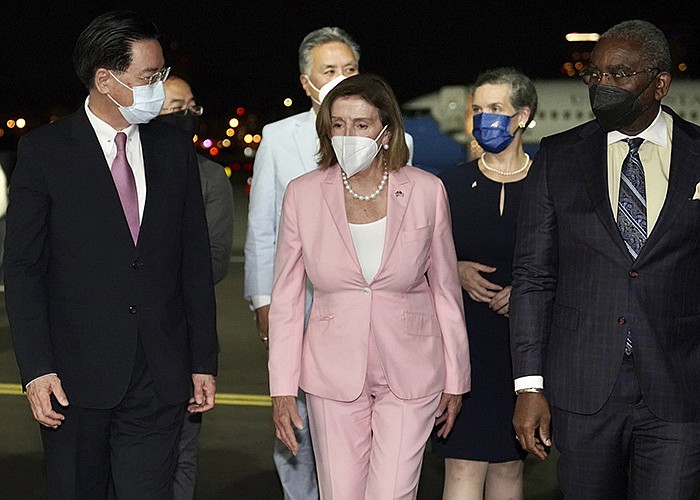TAIPEI, Taiwan -- House Speaker Nancy Pelosi arrived in Taiwan late Tuesday, becoming the highest-ranking American official in 25 years to visit the self-ruled island claimed by China, which quickly announced that it would conduct military maneuvers in retaliation for her presence.
Pelosi flew in aboard an Air Force passenger jet and was greeted on the tarmac at Taipei's international airport by Taiwan's foreign minister and other Taiwanese and American officials. She posed for photos before her motorcade whisked her unseen into the parking garage of a hotel.
Huang Chao-yuan, a 53-year-old business owner, staked out the area near Songshan Airport to watch as Pelosi's plane landed. She said the speaker's visit was a "historic moment" that "demonstrates Taiwan's independence."
But outside the Grand Hyatt Taipei, where Pelosi was expected to spend the night, several dozen people supporting unification with China protested Pelosi's visit. Some clamored for her to "get out of Taiwan," and some held banners denouncing her.
Her visit ratcheted up tension between China and the United States because China claims Taiwan as part of its territory, and it views visits by foreign government officials as recognition of the island's sovereignty.
The Biden administration and Pelosi say the United States remains committed to the so-called one-China policy, which recognizes Beijing but allows informal relations and defense ties with Taipei.
The speaker framed the trip as part of a broader mission at a time when "the world faces a choice between autocracy and democracy." Her visit comes after she led a congressional delegation to the Ukrainian capital of Kyiv in the spring, and it serves as a capstone to her many years of promoting democracy abroad.
"We must stand by Taiwan," she said in an opinion piece published by The Washington Post on her arrival in Taiwan. She cited the commitment that the U.S. made to a democratic Taiwan under a 1979 law.
"It is essential that America and our allies make clear that we never give in to autocrats," she wrote.
Taiwan and China split during a civil war in 1949, but China claims the island as its own territory and has not ruled out using military force to take it.
The Biden administration did not explicitly urge Pelosi to call off her plans. It repeatedly and publicly assured Beijing that the visit did not signal any change in U.S. policy toward Taiwan.
Soon after Pelosi's arrival, China announced a series of military operations and drills, which followed promises of "resolute and strong measures" if Pelosi went through with her visit.
In a separate statement, China's People's Liberation Army said it would begin a series of joint naval and air exercises that would include "long-range live firing in the Taiwan Strait."
The exercises would effectively block access temporarily to some commercial shipping lanes and Taiwanese ports, but analysts said they seemed to be designed to project strength rather than to serve as a precursor to a Chinese invasion of Taiwan.
China's official Xinhua News said the army planned to conduct live-fire drills from Thursday to Sunday across multiple locations. An image released by the news agency indicated that the drills were to take place in six different areas in the waters surrounding Taiwan.
Chinese Foreign Minister Wang Yi said Washington's betrayal "on the Taiwan issue is bankrupting its national credibility."
"Some American politicians are playing with fire on the issue of Taiwan," Wang said in a statement that referred to the U.S. as "the world's biggest saboteur of peace."
OFFERING SUPPORT
Pelosi's forceful stand Tuesday was echoed back in the United States moments after her arrival. Sen. John Boozman of Arkansas and 25 other Senate Republicans issued a statement of support for Pelosi.
"We support Speaker of the House of Representatives Nancy Pelosi's trip to Taiwan," the statement said. "For decades, members of the United States Congress, including previous Speakers of the House, have traveled to Taiwan. This travel is consistent with the United States' One China policy to which we are committed."
Sen. Tom Cotton, R-Ark., was not among the signers listed.
Senate Minority Leader Mitch McConnell, R-Ky., backed Pelosi's visit as a display of support for Taiwan's democracy and said any allegations that her itinerary was provocative were "utterly absurd."
"I believe she has every right to go," McConnell said in a Senate speech.
Senators are considering legislation to bolster Taiwan's defense as a direct response to China's rhetoric. The Taiwan Policy Act, which has support from both parties, will be discussed today by the Senate Foreign Relations Committee.
The package would bolster Taiwan's defense capabilities with nearly $4.5 billion in security assistance over the next four years and provide other support for Taiwan's democratic government and civil society. The measure would also designate Taiwan as a "major non-NATO ally," which opens the door to more security and trade benefits.
Backers call it the most comprehensive restructuring of U.S. policy toward Taiwan since the Taiwan Relations Act of 1979.
Pelosi's trip was not officially announced ahead of time.
"She's a high-ranking official in the U.S. government, but it is not unusual," said Sen. Bob Menendez, D-N.J., chair of the Senate Foreign Relations Committee. "I was there three months ago with five other senators. We have a longstanding history of visiting Taiwan. And so we can't let the Chinese say who can and cannot visit Taiwan."
Barricades were erected outside the Grand Hyatt Hotel in Taipei. Journalists and onlookers thronged the streets just outside and pressed against the hotel's lobby windows as they awaited Pelosi's motorcade. Two buildings in the capital lit up LED displays with words of welcome, including the iconic Taipei 101 building, which said "Welcome to Taiwan, Speaker Pelosi."
China has stepped up overflights and other provocative moves toward Taiwan and neighboring territory in recent years, asserting broad claims of its rights around the region.
China's military threats have driven concerns about a new crisis in the 100-mile-wide Taiwan Strait that could roil global markets and supply chains.
The White House insisted that China had no valid cause for anger.
"The United States will not seek, and does not want, a crisis," John Kirby, spokesman for the National Security Council, told a White House briefing Tuesday. "At the same time, we will not engage in saber-rattling."
U.S. officials have said the American military will increase its movements in the Indo-Pacific region during Pelosi's visit. The aircraft carrier USS Ronald Reagan and its strike group were in the Philippine Sea on Monday, according to officials who spoke on condition of anonymity to discuss military operations.
The Reagan, the cruiser USS Antietam and the destroyer USS Higgins left Singapore after a port visit and moved north to their home port in Japan.
Meanwhile, Taiwan's Defense Ministry said China had sent 21 planes flying toward Taiwan, 18 of them fighter jets. The rest included an early warning plane and an electronic warfare plane.
Beijing sees official American contact with Taiwan as encouragement to make the island's decades-old de facto independence permanent, a step U.S. leaders say they don't support. Pelosi, head of one of three branches of the U.S. government, is the highest-ranking elected American official to visit Taiwan since then-Speaker Newt Gingrich in 1997.
Pelosi's aircraft, an Air Force version of the Boeing 737, took a roundabout route, flying east over Indonesia rather than directly over the South China Sea.
PELOSI'S RECORD
From student demonstrators in Beijing in 1989 to anti-government protests in Hong Kong 30 years later, Pelosi has consistently supported social movements that critiqued China's ruling Communist Party. She has also urged China's leaders to temper their authoritarian policies, criticism that has elicited tart ripostes from Chinese officials.
As a two-term congresswoman from California, Pelosi visited Beijing in 1991, two years after Chinese troops opened fire on student protesters around Tiananmen Square, killing hundreds if not thousands. Accompanied to the square by several congressional colleagues and a small group of reporters, Pelosi unfurled a banner commemorating the dead students.
In 2009, she hand-delivered a letter to then-President Hu Jintao calling for the release of political prisoners. She had sought to visit Taiwan's island democracy earlier this year before testing positive for covid-19.
Pelosi is a strong supporter of the Dalai Lama and the rights of Tibetans. In 2015, with official permission from the Chinese government, she visited Lhasa, the capital of Tibet, on a tightly controlled trip. The region is usually off limits to foreign officials and journalists.
The Chinese community in San Francisco, which Pelosi represents, was outwardly very supportive of Taiwan from the 1950s until the early 1990s. Today, it is much more connected to the mainland, partly due to immigration trends and the rise of China's power and influence in the world.
Dozens of people gathered in San Francisco on Monday to protest the trip, arguing that it could inflame potential war with China. The demonstration included members of the city's Chinese American community; Code Pink: Women for Peace, an anti-war group; and the U.S.-China Peoples Friendship Association.
China has been steadily ratcheting up diplomatic and military pressure on Taiwan. China cut off all contact with Taiwan's government in 2016 after President Tsai Ing-wen refused to endorse its claim that the island and mainland together make up a single Chinese nation, with the communist regime in Beijing being the sole legitimate government.
Pelosi kicked off her Asian tour Monday in Singapore. She is to travel to Japan and South Korea later this week.
Information for this article was contributed by Huizhong Wu, Eileen Ng, Lisa Mascaro, Jim Gomez, Mari Yamaguchi and Zeke Miller of The Associated Press, by Frank Lockwood of the Arkansas Democrat-Gazette and by Paul Mozur, Amy Chang Chien and Michael D. Shear of The New York Times.
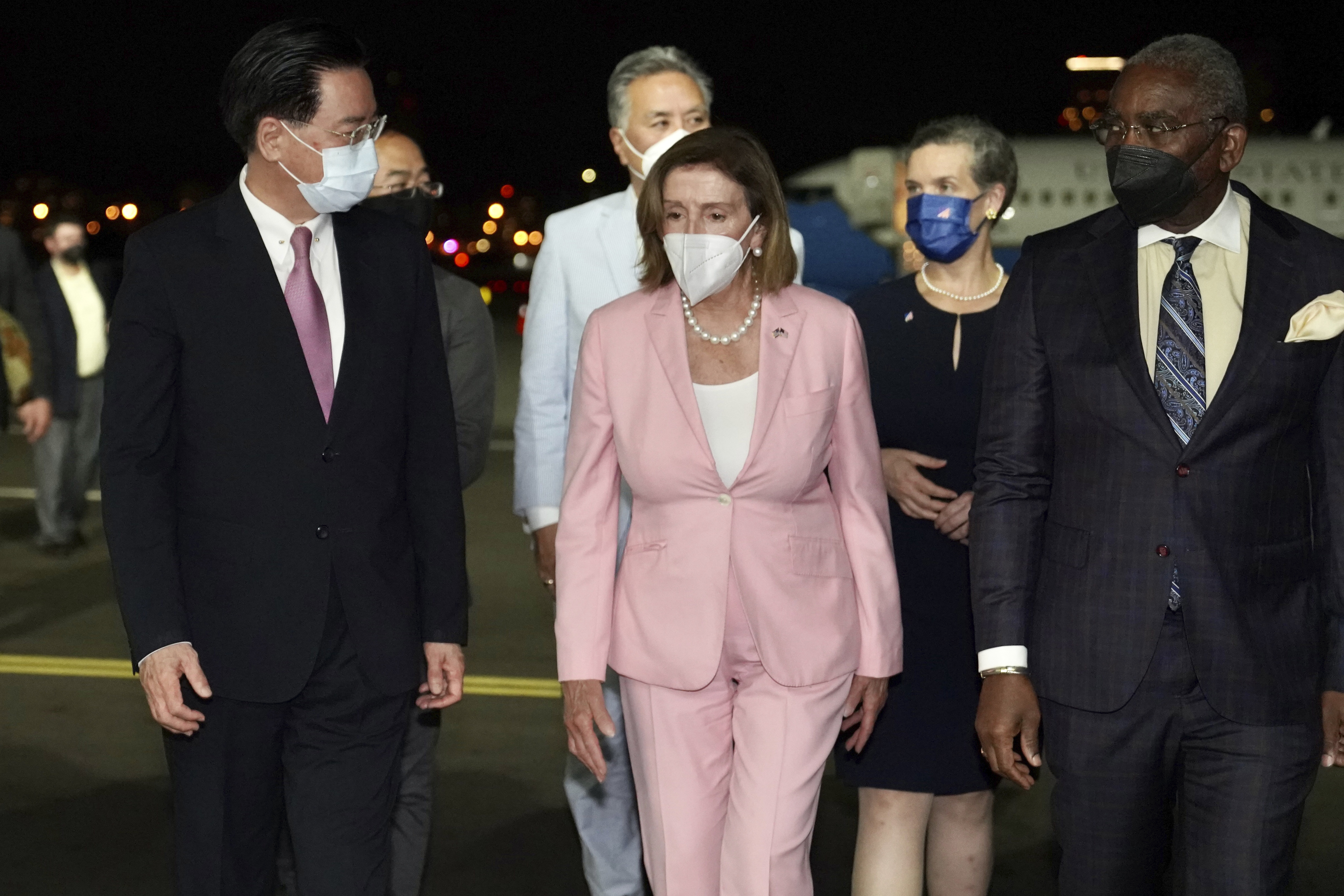 In this photo released by the Taiwan Ministry of Foreign Affairs, U.S. House Speaker Nancy Pelosi, center, walks with Taiwan's Foreign Minister Joseph Wu, left, as she arrives in Taipei, Taiwan, Tuesday, Aug. 2, 2022. Pelosi arrived in Taiwan on Tuesday night despite threats from Beijing of serious consequences, becoming the highest-ranking American official to visit the self-ruled island claimed by China in 25 years. ( Taiwan Ministry of Foreign Affairs via AP)
In this photo released by the Taiwan Ministry of Foreign Affairs, U.S. House Speaker Nancy Pelosi, center, walks with Taiwan's Foreign Minister Joseph Wu, left, as she arrives in Taipei, Taiwan, Tuesday, Aug. 2, 2022. Pelosi arrived in Taiwan on Tuesday night despite threats from Beijing of serious consequences, becoming the highest-ranking American official to visit the self-ruled island claimed by China in 25 years. ( Taiwan Ministry of Foreign Affairs via AP)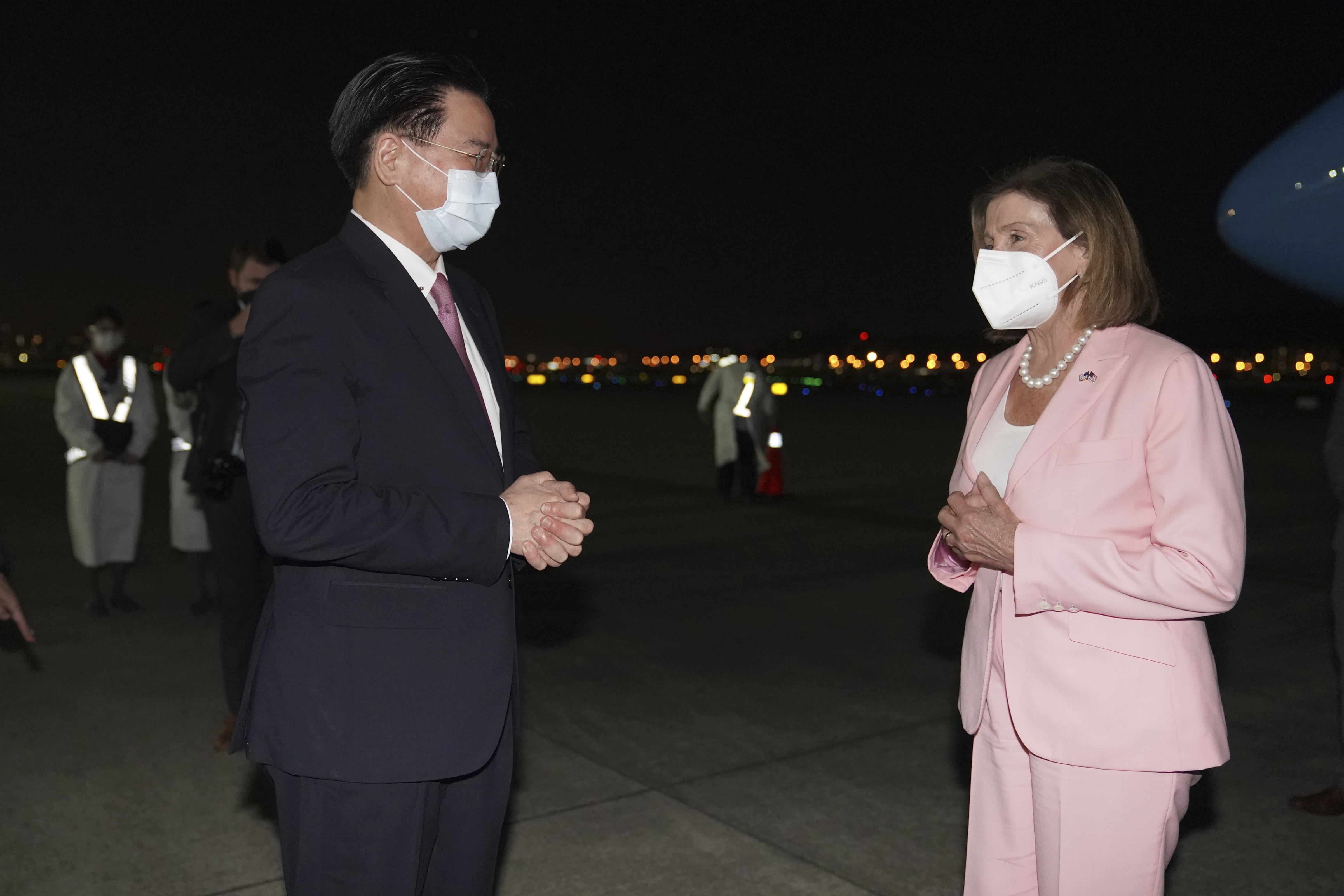 In this photo released by the Taiwan Ministry of Foreign Affairs, U.S. House Speaker Nancy Pelosi, right is greeted by Taiwan's Foreign Minister Joseph Wu as she arrives in Taipei, Taiwan, Tuesday, Aug. 2, 2022. Pelosi arrived in Taiwan on Tuesday night despite threats from Beijing of serious consequences, becoming the highest-ranking American official to visit the self-ruled island claimed by China in 25 years. ( Taiwan Ministry of Foreign Affairs via AP)
In this photo released by the Taiwan Ministry of Foreign Affairs, U.S. House Speaker Nancy Pelosi, right is greeted by Taiwan's Foreign Minister Joseph Wu as she arrives in Taipei, Taiwan, Tuesday, Aug. 2, 2022. Pelosi arrived in Taiwan on Tuesday night despite threats from Beijing of serious consequences, becoming the highest-ranking American official to visit the self-ruled island claimed by China in 25 years. ( Taiwan Ministry of Foreign Affairs via AP)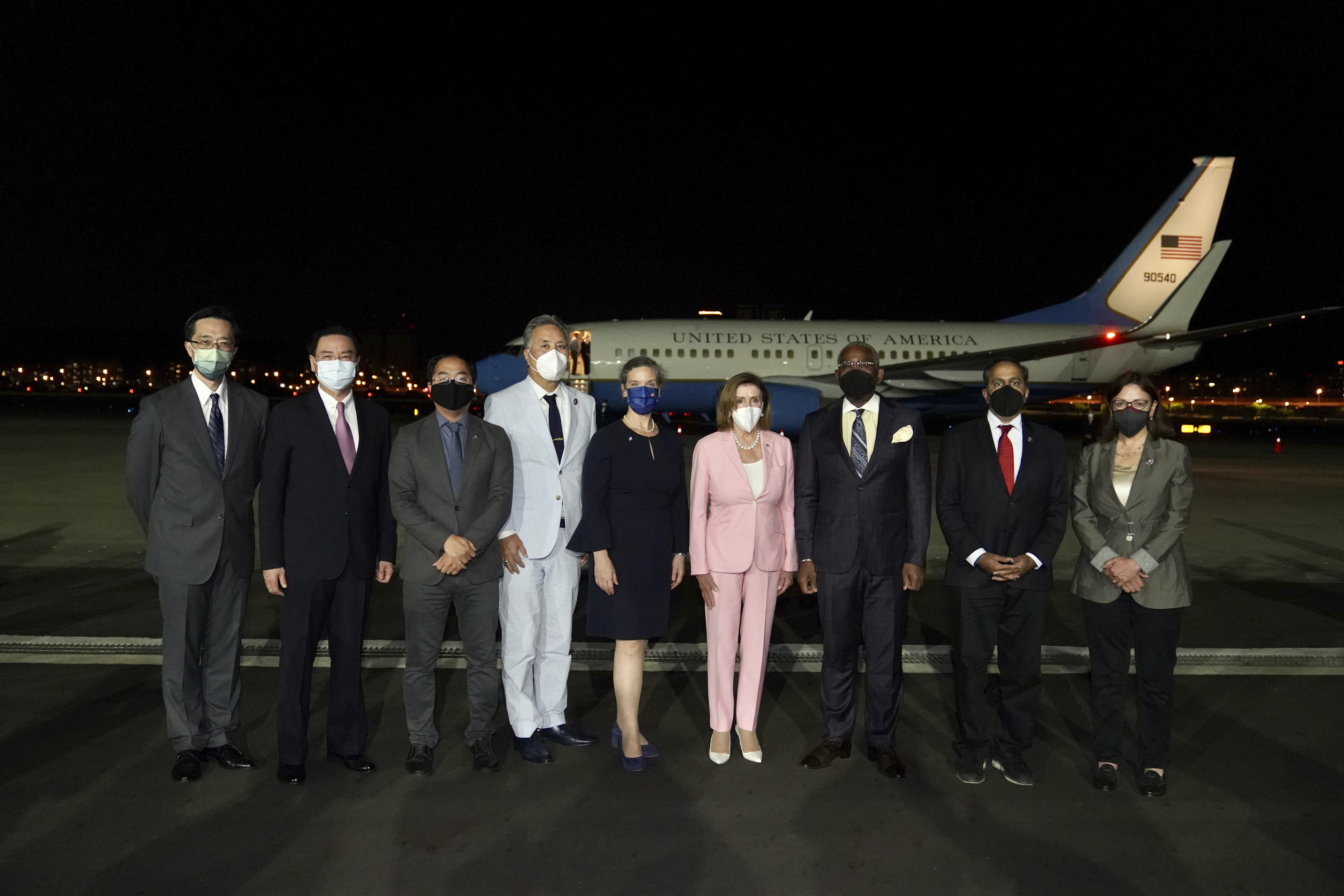 In this photo released by the Taiwan Ministry of Foreign Affairs, U.S. House Speaker Nancy Pelosi, center pose for photos after she arrives in Taipei, Taiwan, Tuesday, Aug. 2, 2022. Pelosi arrived in Taiwan on Tuesday night despite threats from Beijing of serious consequences, becoming the highest-ranking American official to visit the self-ruled island claimed by China in 25 years. ( Taiwan Ministry of Foreign Affairs via AP)
In this photo released by the Taiwan Ministry of Foreign Affairs, U.S. House Speaker Nancy Pelosi, center pose for photos after she arrives in Taipei, Taiwan, Tuesday, Aug. 2, 2022. Pelosi arrived in Taiwan on Tuesday night despite threats from Beijing of serious consequences, becoming the highest-ranking American official to visit the self-ruled island claimed by China in 25 years. ( Taiwan Ministry of Foreign Affairs via AP)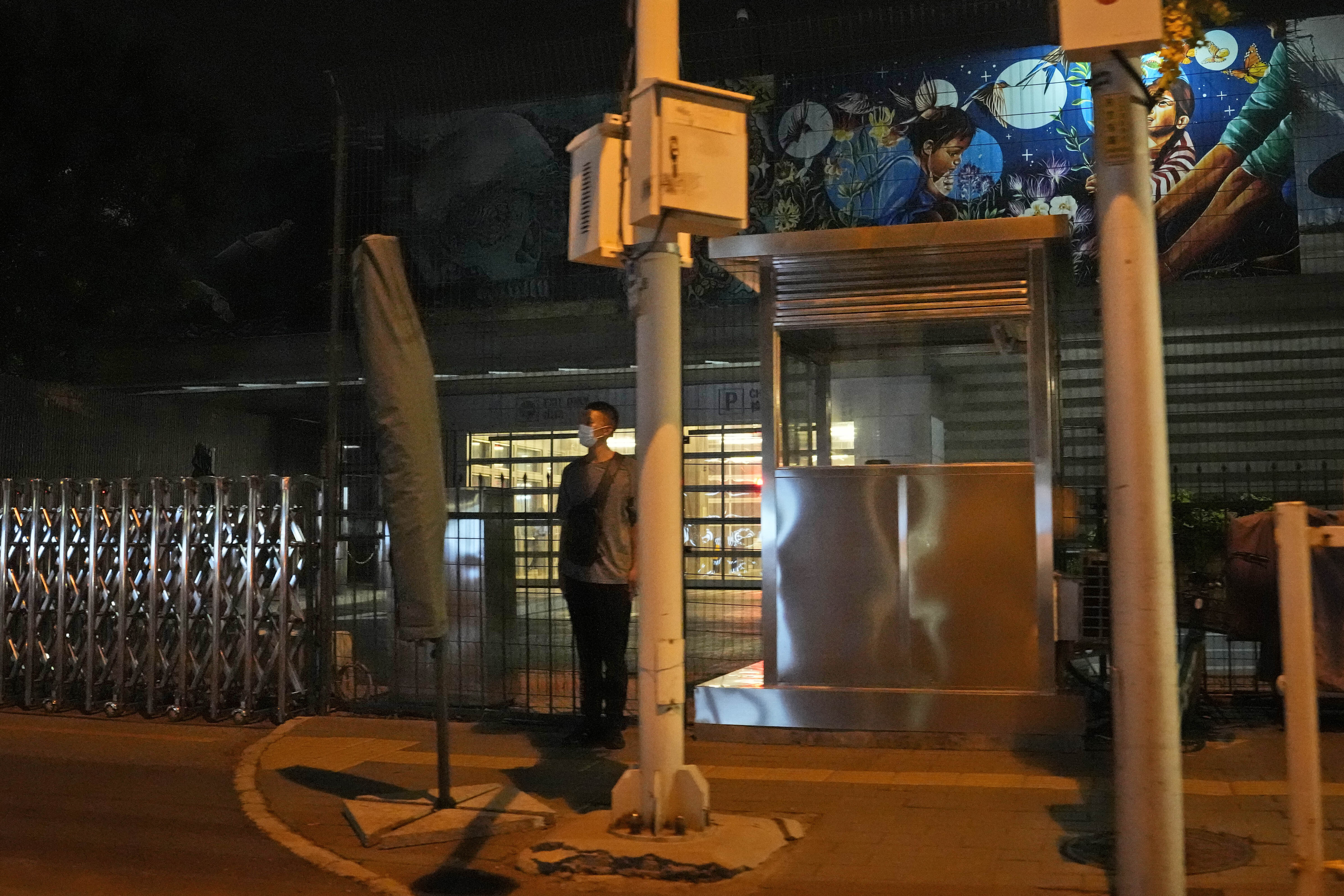 A Chinese security guard stands outside the United States embassy in Beijing, Tuesday, Aug. 2, 2022. U.S. House Speaker Nancy Pelosi arrived in Taiwan on Tuesday night despite threats from Beijing of serious consequences, becoming the highest-ranking American official to visit the self-ruled island claimed by China in 25 years. (AP Photo/Ng Han Guan)
A Chinese security guard stands outside the United States embassy in Beijing, Tuesday, Aug. 2, 2022. U.S. House Speaker Nancy Pelosi arrived in Taiwan on Tuesday night despite threats from Beijing of serious consequences, becoming the highest-ranking American official to visit the self-ruled island claimed by China in 25 years. (AP Photo/Ng Han Guan)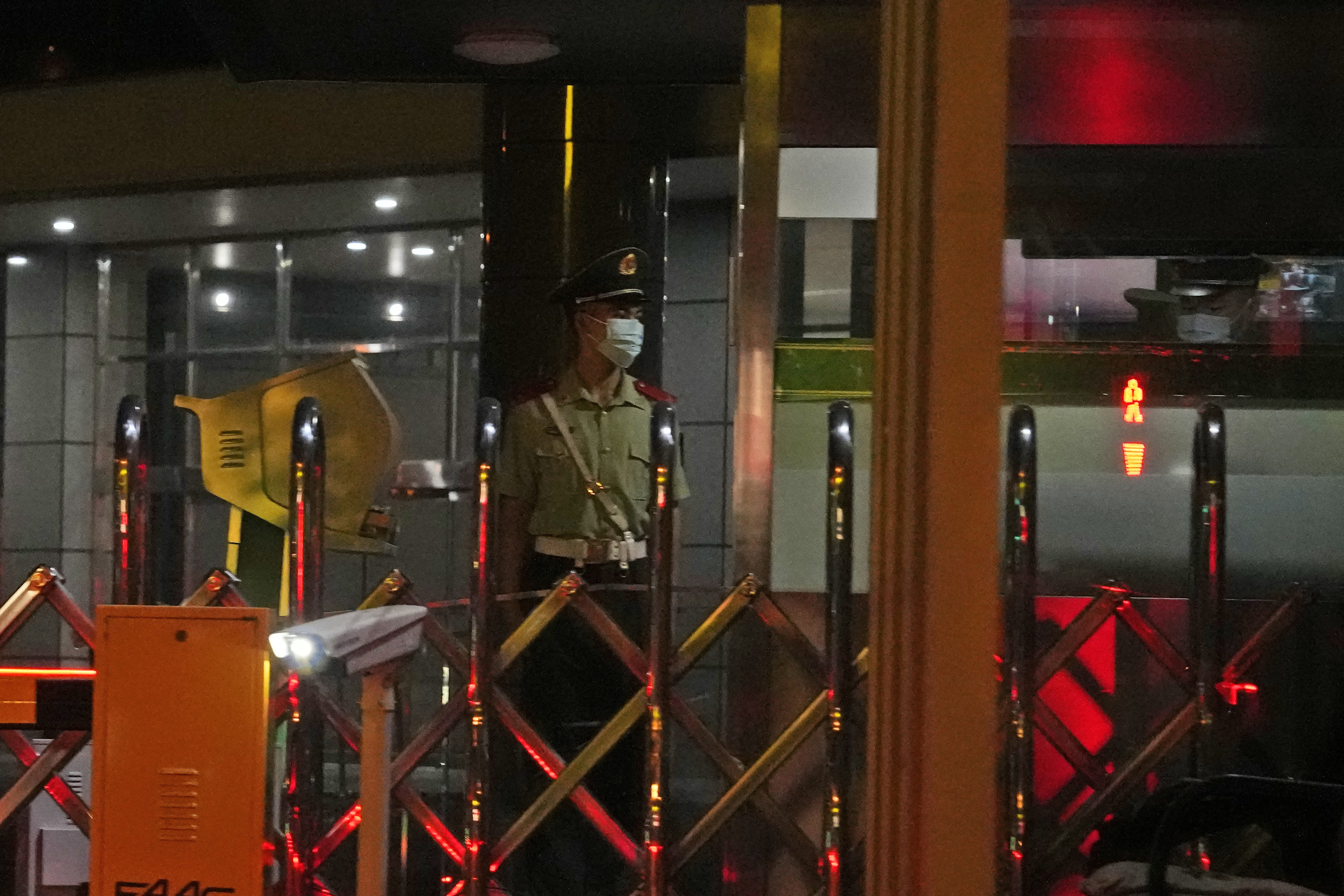 A Chinese paramilitary policeman wearing a mask stands guard outside the Foreign Ministry in Beijing, Tuesday, Aug. 2, 2022. U.S. House Speaker Nancy Pelosi arrived in Taiwan on Tuesday night despite threats from Beijing of serious consequences, becoming the highest-ranking American official to visit the self-ruled island claimed by China in 25 years. (AP Photo/Ng Han Guan)
A Chinese paramilitary policeman wearing a mask stands guard outside the Foreign Ministry in Beijing, Tuesday, Aug. 2, 2022. U.S. House Speaker Nancy Pelosi arrived in Taiwan on Tuesday night despite threats from Beijing of serious consequences, becoming the highest-ranking American official to visit the self-ruled island claimed by China in 25 years. (AP Photo/Ng Han Guan)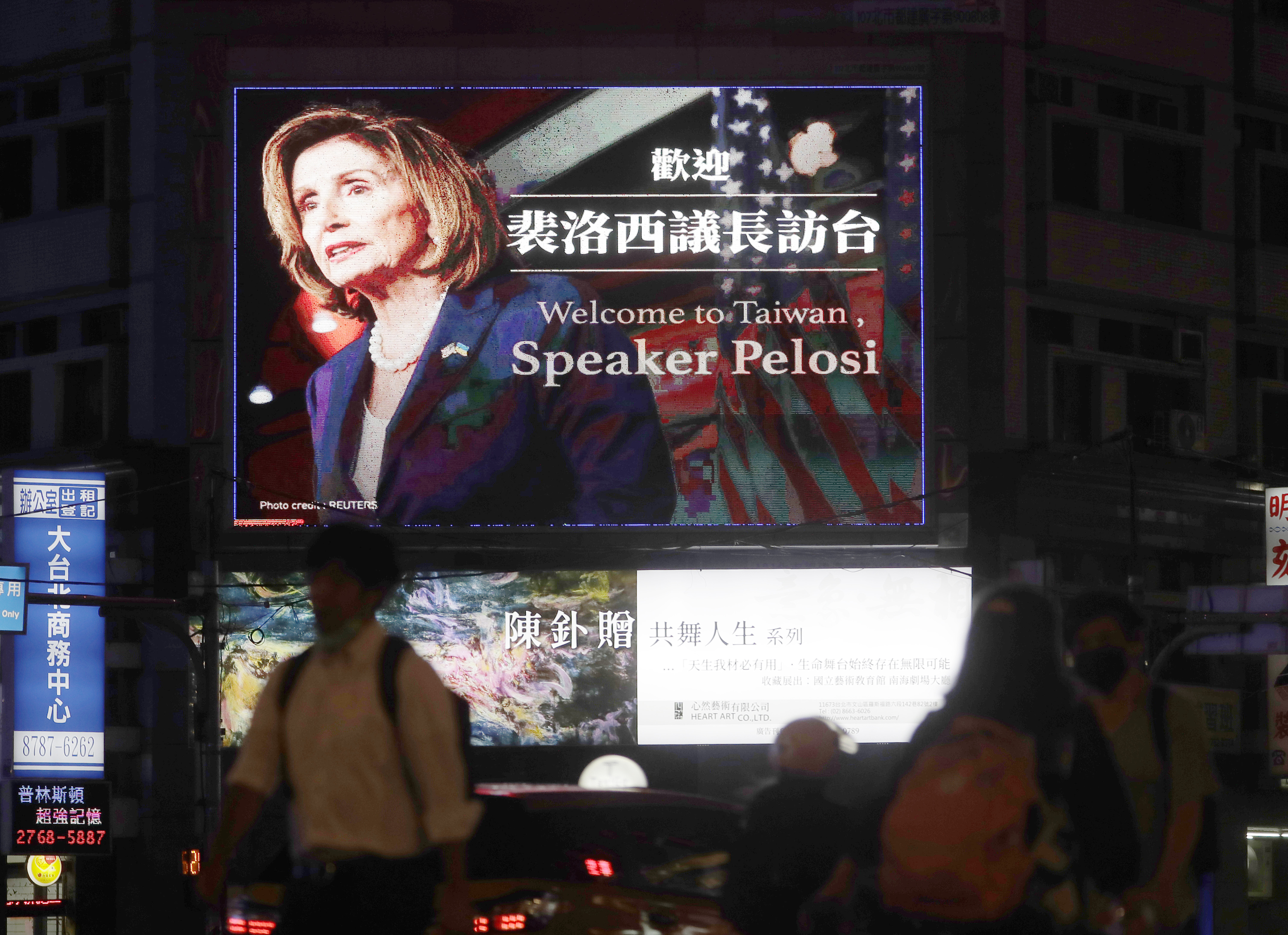 People walk past a billboard welcoming U.S. House Speaker Nancy Pelosi, in Taipei, Taiwan, Tuesday, Aug 2, 2022. Pelosi has arrived in Taiwan and becomes the highest-ranking American official in 25 years to visit the self-ruled island claimed by China, which quickly announced that it would conduct military maneuvers in retaliation for her presence. (AP Photo/Chiang Ying-ying)
People walk past a billboard welcoming U.S. House Speaker Nancy Pelosi, in Taipei, Taiwan, Tuesday, Aug 2, 2022. Pelosi has arrived in Taiwan and becomes the highest-ranking American official in 25 years to visit the self-ruled island claimed by China, which quickly announced that it would conduct military maneuvers in retaliation for her presence. (AP Photo/Chiang Ying-ying)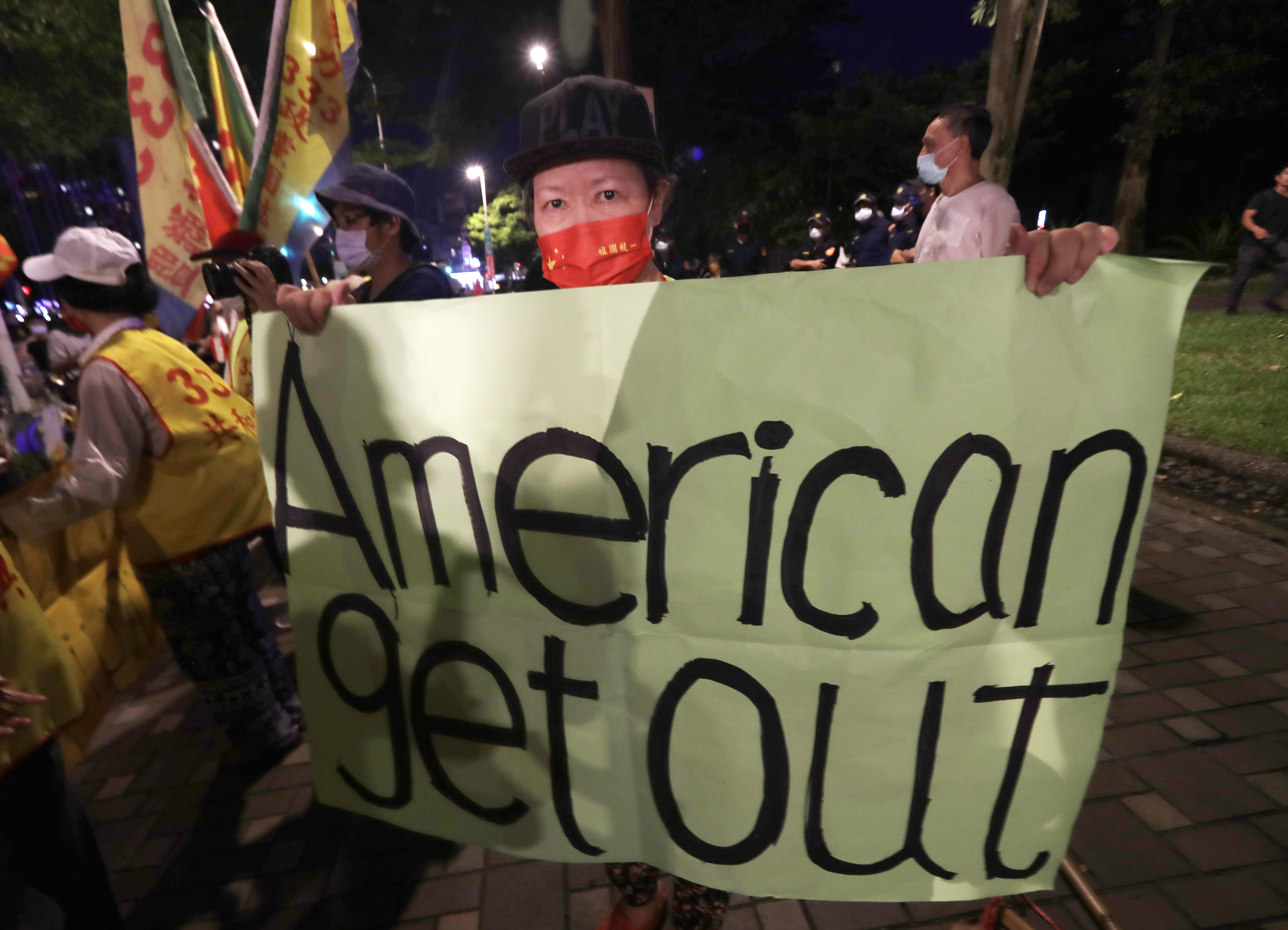 A protester holds a banner during a protest against the visit of United States House Speaker Nancy Pelosi, outside a hotel in Taipei, Taiwan, Tuesday, Aug 2, 2022. Pelosi arrived in Taiwan on Tuesday on a visit that could significantly escalate tensions with Beijing, which claims the self-ruled island as its own territory. (AP Photo/Chiang Ying-ying)
A protester holds a banner during a protest against the visit of United States House Speaker Nancy Pelosi, outside a hotel in Taipei, Taiwan, Tuesday, Aug 2, 2022. Pelosi arrived in Taiwan on Tuesday on a visit that could significantly escalate tensions with Beijing, which claims the self-ruled island as its own territory. (AP Photo/Chiang Ying-ying)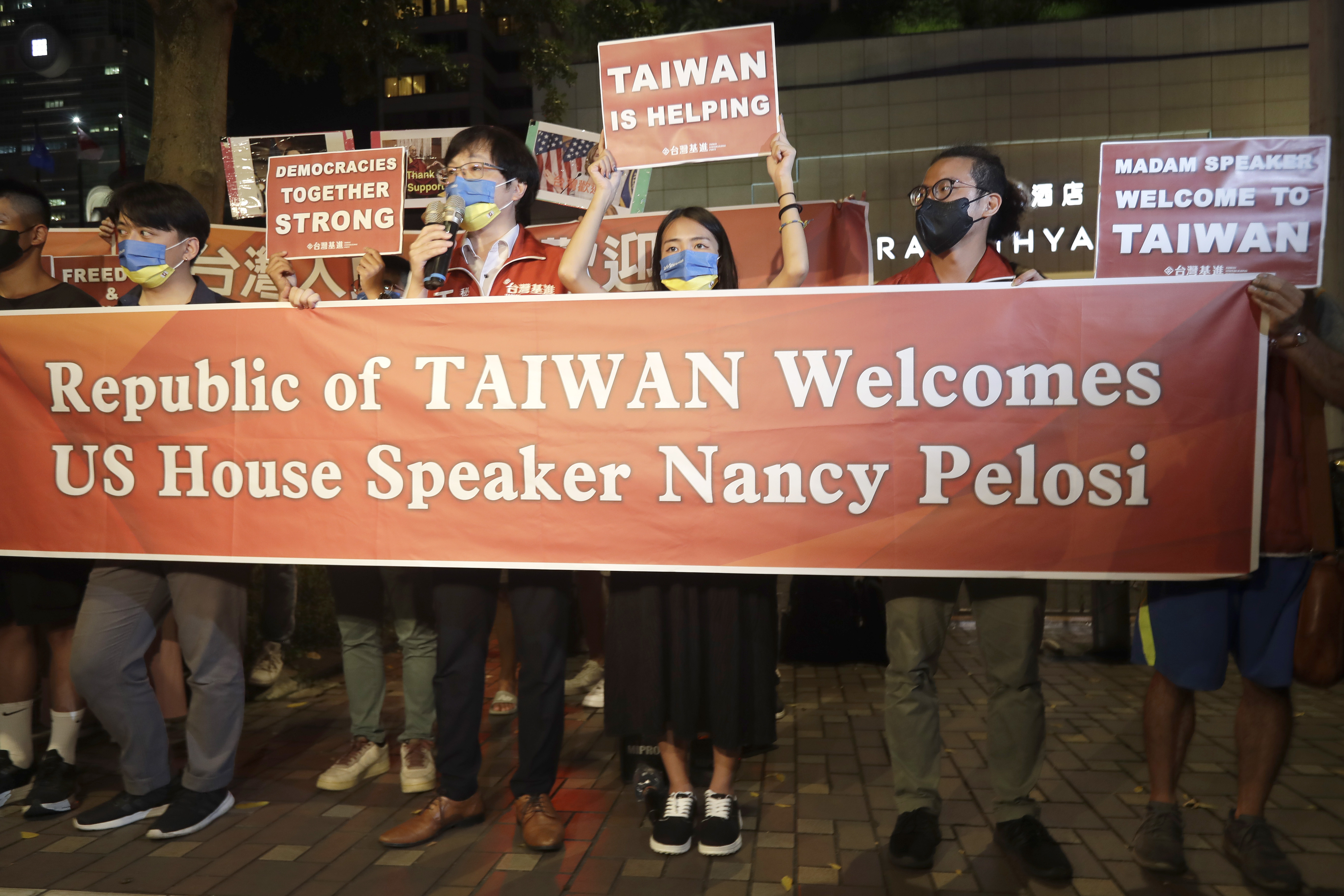 Supporters hold a banner outside the hotel where U.S. House Speaker Nancy Pelosi is supposed to be staying in Taipei, Taiwan, Tuesday, Aug 2, 2022. U.S. House Speaker Nancy Pelosi was believed headed for Taiwan on Tuesday on a visit that could significantly escalate tensions with Beijing, which claims the self-ruled island as its own territory. (AP Photo/Chiang Ying-ying)
Supporters hold a banner outside the hotel where U.S. House Speaker Nancy Pelosi is supposed to be staying in Taipei, Taiwan, Tuesday, Aug 2, 2022. U.S. House Speaker Nancy Pelosi was believed headed for Taiwan on Tuesday on a visit that could significantly escalate tensions with Beijing, which claims the self-ruled island as its own territory. (AP Photo/Chiang Ying-ying)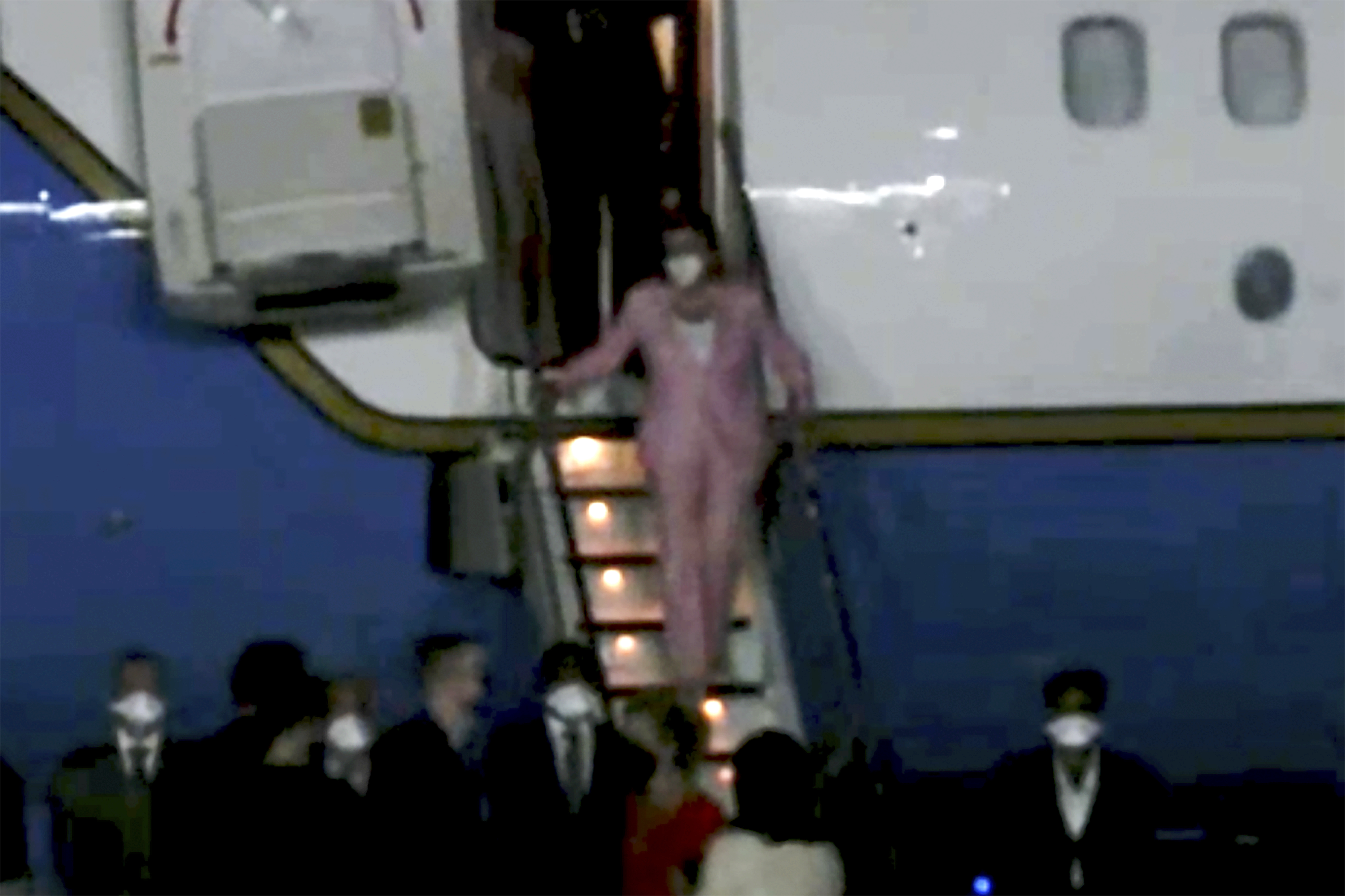 In this image taken from video, U.S. House Speaker Nancy Pelosi exits a plane as she arrives in Taipei, Taiwan, Tuesday, Aug. 2, 2022. Pelosi arrived in Taiwan on Tuesday night despite threats from Beijing of serious consequences, becoming the highest-ranking American official to visit the self-ruled island claimed by China in 25 years. (Taiwan Ministry of Foreign Affairs via AP)
In this image taken from video, U.S. House Speaker Nancy Pelosi exits a plane as she arrives in Taipei, Taiwan, Tuesday, Aug. 2, 2022. Pelosi arrived in Taiwan on Tuesday night despite threats from Beijing of serious consequences, becoming the highest-ranking American official to visit the self-ruled island claimed by China in 25 years. (Taiwan Ministry of Foreign Affairs via AP)